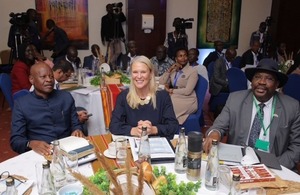Wallace said the inflationary pressures alone on the budget could total about £8 billion (U.S. $9 billion) over two years…reports Asian Lite News
Britain’s defense secretary appeared before the parliamentary Defence Committee on Wednesday, with lawmakers eager to quiz him about the impact of inflation, exchange rates and possible spending cuts.
Ben Wallace told lawmakers that inflation and a weak pound versus the U.S. dollar were key issues affecting spending.
“In the here and now, next two years up to 2025, I need money to protect me from inflation and forex,” he said, referring to the foreign exchange market. ”They are the two main challenges to the defense budget I have between now and the next spending review.”
Wallace said the inflationary pressures alone on the budget could total about £8 billion (U.S. $9 billion) over two years.
“As a very capital-dependent department, we are much more vulnerable to inflationary costs than other departments on our programs and equipment,” Wallace said.
British inflation is currently at 10.1% and climbing, while the pound has fallen from $1.34 to $1.14.
Wallace was in front of the committee to talk about U.S., U.K. and NATO relations. But the lawmakers, led by the panel’s chairman, Tobias Ellwood, grabbed the opportunity to question the defense secretary about more pressing domestic issues related to money and key equipment programs.
Wallace is scheduled to meet Chancellor Jeremy Hunt on Thursday to begin thrashing out how much money the department will get when the government rolls out its new budget Nov. 17. Defense faces the requirement to plug a £40+ billion black hole in its finances; mainly by way of raised taxes and departmental spending cuts.
Wallace is scheduled to meet Jeremy Hunt on Thursday to begin thrashing out how much money the Defence Ministry will get when the government rolls out its new budget Nov. 17, with a requirement to plug a £40 billion or more black hole in its public finances — mainly via raised taxes and departmental spending cuts.
Gone are the days of the recent past where now ex-Prime Ministers Boris Johnson and Liz Truss were promising Wallace a rise in defense spending by around 2028 to 3% of gross domestic product, up from a whisker over 2% now.
Wallace told lawmakers on the committee that the 3% figure is now “aspirational.”
That surprised nobody. Committee member Mark Francois, a former defense minister, said Wallace’s response was disappointing.
“Those of us who have been in politics for a while know what that [aspirational] means. So at least spend 2.5% of GDP by 2026,” Francois asked.
Wallace didn’t reply directly, saying he “meets with the chancellor tomorrow and over the next few weeks until the budget, and I will be fighting for as much money as I can get. … We are keen to make sure the chancellor believes it should be raised up the profile and we can see where we are in the next few weeks,” he said.
It wasn’t just defense spending the committee quizzed Wallace about. Key equipment programs also were on the agenda.
The defense secretary reported that the MoD had signed a deal to start replenishing missile stocks run down by the supply of weapons to the Ukraine.
Five hundred NLAW anti-tank weapons are scheduled for delivery from missile maker Thales U.K. next year, and Wallace said a further deal for thousands of weapons for Britain and other customers will be signed next year.
There was some positive news on progress with the troubled £5.5 billion Ajax armored reconnaissance vehicle program for the British Army, which has been stalled for years by serious vibration and noise problems.
Wallace said the vehicle, being built by General Dynamics UK, had now completed its user validation trials.
“They will now analyze the data and commence into reliability and growth trials, hopefully in December or January,” he said.
Wallace’s appearance in front of the Defence Committee wasn’t his only parliamentary duty Nov 2.
He also issued a statement to Parliament detailing delays to the first Type 26 anti-submarine warfare frigate being built by BAE Systems Goven yard in Scotland.
The statement said initial operating capability will be delayed 12 months, to October 2028.
Wallace blamed the coronavirus pandemic as well as design and equipment supply delays for the date slip.
The first three of eight planned Type 26s are in various stages of construction.
ALSO READ-Wallace joins ceremonial guard beside Queen’s coffin












